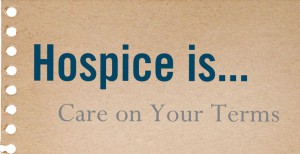Why You Should Know About Hospice
When hospice nurses were asked, what hospice is to them, they wrote the following:
– Hospice is Being There
– Hospice is Wishes Respected
– Hospice is Having a choice to be home
– Hospice is Telling the truth, even when it’s hard
– Hospice is a gift
(source)
Hospice. It can be a controversial word. For some, it stirs up anxiety, panic, fear, death – for others, comfort, a blessing, an answer. Many people limit hospice to being just about dying when, if you think about it, hospice really is about living the best you can with the most comfort, peace, and self-respect possible in your last days.
I remember a session I attended with Barbara Karnes, a pioneer of the hospice movement, she said something very strange: “Dying is the hardest thing we live through.” Pause, think about that. “Dying is the hardest thing we live through.”
She’s right, we don’t think about the living part because the dying is so terrifying, but we are alive while we are dying. It’s that strange part of life, this place of transition, the path we will never re-trace, it’s here where hospice comes in.
With November being National Hospice and Palliative Care Month, I felt this blog should take this opportunity to speak to these specialties and why they are so important.
There are so many questions surrounding hospice, here are some of the top ones we hear:
– What is the difference between Hospice and Palliative care?
Hospice is focused specifically on end-of-life comfort and care for anyone with a life expectancy of 6 months or less. Palliative care differs in that it deals specifically with people suffering from a serious illness but not necessarily dying from it. Palliative offers comfort care to long-term suffering people and, like hospice, shares the goal of making daily life more enjoyable and rich.
– What is the role of hospice?
 Hospice care is about managing a whole body of care around a person who has limited time left. Outside of the medical care and services, hospice also cares for the caregiver. Offering emotional support to the caregiver, emphasis on their own self-care, and even after the loss has occurred, most hospices provide bereavement services for at least a year to the caregiver.
Hospice care is about managing a whole body of care around a person who has limited time left. Outside of the medical care and services, hospice also cares for the caregiver. Offering emotional support to the caregiver, emphasis on their own self-care, and even after the loss has occurred, most hospices provide bereavement services for at least a year to the caregiver.
Often issues surrounding spirituality, meaning, hope, pain and forgiveness are more focused during a terminal illness. As part of the hospice healthcare team, Hospice Chaplains make Spiritual Care a priority. Chaplains offer a supportive presence and acceptance of different beliefs, cultures and values.
– When in the course of an illness should someone go on hospice?
Usually earlier than they do. When there’s a very good chance that the illness won’t be cured and the person needs help with the pain and symptoms, that’s a good time to talk to hospice about what they could do to help (www.nhopc.org). It’s all about their goal, are they still looking for curative treatment? If so, they aren’t ready for hospice. Hospice is for someone who doesn’t wish to pursue cures, their goal is quality end-of-life vs. quantity end-of-life.
– What does hospice cost?
Because hospice is provided by Medicare and Medicaid and because it really does make a difference for people in quality of life and quality of care, most insurance covers hospice care. Hospice is actually even an opportunity to relieve financial burden because hospice covers medication, supplies, and staff coming out to the home.
// do you have more questions? leave them in the comments below //
According to the National Hospice and Palliative Care Organization, 90% of adults believe it is the job of a family member to care for their dying loved one – I don’t think you’d find many hospice workers who disagree. What a hospice worker or volunteer would say to that care-giving family member is this, “I am here to help you as well. Yes, I work for hospice and your loved one is our patient, but you are their family, and I am also here to guide, support and help you. Let me. This is too hard to do alone.”
This testimonial video chronicles Karen and her family’s journey with hospice. Initially, Karen thought hospice was a bed, a place she had to go and essentially wait to die. She shares in this video how different and truly wonderful having hospice has been for her. Here’s what her husband, Bill, has to say about it:
 “The beauty of hospice is that it provides us with the resources we need to live our lives here at home … my wife is able to be [home] everyday to interact with the kids, interact with me… [hospice] puts the patient in a position to maximize whatever energy they have and it tends to have a positive impact on the patient.”
“The beauty of hospice is that it provides us with the resources we need to live our lives here at home … my wife is able to be [home] everyday to interact with the kids, interact with me… [hospice] puts the patient in a position to maximize whatever energy they have and it tends to have a positive impact on the patient.”
To learn more about Hospices around the nation, check out these resourceful & informative websites:
– Coalition of Compassionate Care of California | www.coalitionccc.org
– Hospice Foundation of America | www.hospicefoundation.org
– National Hospice and Palliative Care Organization | www.nhpco.org
|| what do you think?
– Do you have any experience with hospice or palliative care? What was it like?
– What are the first words you think of when you hear the word “hospice”?
– What questions do you still have about hospice or palliative care?
We’d love to answer them either in the comments below or an upcoming sequel to this blog post.





12 Comments
Thank you for all the great info. I believe going through the experience with hospice instead of a hospital is much more significant and humane. People don’t realize how comforting hospice can be. Molly, as always, Thank you again.
Molly,
Great information. Like most, when I hear the word “Hospice,” I think of an impending death and a family sharing the last hours or days with one they love. As we know, hospice nurses and doctors share in the final journey and typically perform a stellar job for their patients. I know that if I have the opportunity to die at home, I will wish to be under hospice care.
Molly,
This is great information. Hospice is such a valuable ministry. I use the word ministry because it truly can be a God send to the patient and family. When my mother was dying of brain cancer back in the mid 1980’s, hospice was new to our area. I do remember my parents were not comfortable with having a stranger become involved in such a personal family matter. They elected to have a private nurse attend to my mother’s needs. How times have really changed. Hospice is now seen a a very common part of the process when a person is dying. Thank you for sharing the information and acknowledging the importance of the hospice field.
FItz
Molly,
Hospice is such a wonderful gift to families during this very difficult time. It can be so powerful to acknowledge the reality of a pending death and allow Hospice to make those last months, weeks and days as comfortable and peaceful as possible. At the same time they are a great resource to the family as a whole. Doing what we do we speak to many families that have used Hospice services and the overwhelming response is extremely positive. “I do not know how I would have done it without them?” When I hear hospice I think of selfless care and compassion and serving our fellow men and women in their time of need. Thanks Molly.
Chuck
Yes, Joanna – I think “emotional endeavor” sums it up really well. There’s so much to process and so much pain that I think hospice often gets a bad wrap (just like the Funeral Profession) simply because no one WANTS hospice or a mortuary.
Thank you for sharing!